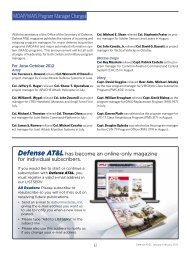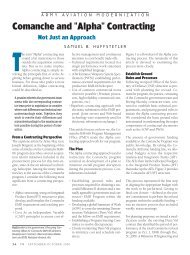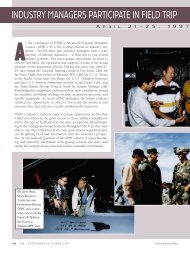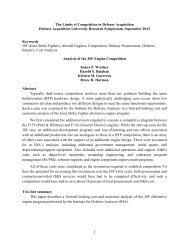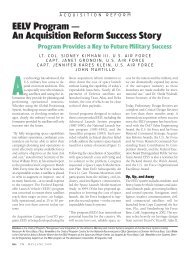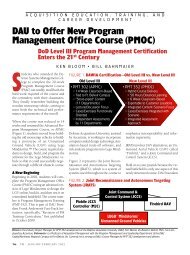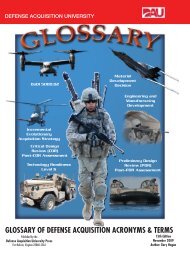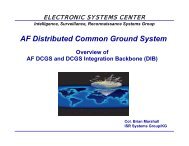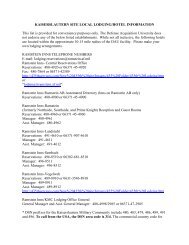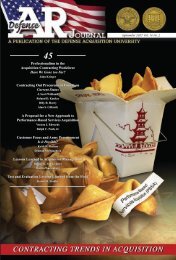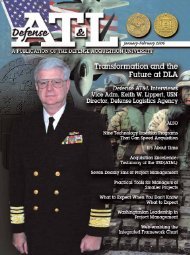Defense ARJ - Defense Acquisition University
Defense ARJ - Defense Acquisition University
Defense ARJ - Defense Acquisition University
You also want an ePaper? Increase the reach of your titles
YUMPU automatically turns print PDFs into web optimized ePapers that Google loves.
<strong>Defense</strong> <strong>Acquisition</strong> Review Journal<br />
practice (COP) or by classroom teaching from within or by an institution such as the<br />
DAU. Once the required amount of training is determined, the authors recommend<br />
that the entire acquisition team should participate in Phase 3 together. This develops<br />
teamwork in the learning process, which benefits the acquisition team.<br />
feeDBack<br />
Cost-plus-award-fee and other incentive-type contracts provide contractors with<br />
numerous avenues to communicate openly with the government during contract performance.<br />
Moreover, incentive contracts provide the government with greater input or<br />
leverage to motivate contractors to achieve exceptional performance. More specifically,<br />
the authors recommend that program offices document in their contracting file the use<br />
of any subjective incentives, rollover features, incentive ratings, creative approaches<br />
to incentivizing, and any exceptions to policy. Documentation or approvals required to<br />
take a certain specialized acquisition approach should never discourage one from being<br />
innovative, if the business acumen supports such an approach. The authors also recommend<br />
that program offices create a glossary of terms, particularly terms related to critical<br />
outcomes or events. This will prevent misunderstanding between the program office<br />
and the contractor in the evaluation of incentives, and also prove helpful for personnel<br />
who are new to the program office and its associated terminology.<br />
aWarD fee<br />
When an acquisition tool comes under scrutiny, the tendency is to avoid it. This<br />
has occurred with award fee contracts. Invariably, in certain circumstances only a<br />
subjective incentive will achieve the desired goal or outcome. However, award fee<br />
should be used only when performance cannot be determined objectively. The contract<br />
file should clearly communicate the rationale and decision to use award fee. This<br />
may result in a multiple incentive-type contract containing both incentive and award<br />
fee clauses. This is consistent with new guidance provided by memorandum from the<br />
Office of the Under Secretary of <strong>Defense</strong> for <strong>Acquisition</strong>, Technology and Logistics<br />
(OUSD[AT&L] Memorandum, April 2007). The following recommendations relate<br />
primarily to award fee:<br />
Base Fee. Use base fee in CPAF contracts. It provides the necessary leverage<br />
for the proper use of the award portion of CPAF. The DFARS (216.405-2(c) (iii))<br />
currently has a limit of 3 percent on base fee. Consider requesting a deviation to the<br />
DFARS to increase the base fee percentage and make better use of base fee as a leverage<br />
tool.<br />
Evaluation Periods. Set the award fee periods based on events or outcomes rather<br />
than based on time. This will ensure that the award fee will be appropriate for the<br />
work accomplished within the period.<br />
Relate Fees to Outcomes. The percentage of the fee pool for the award portion of<br />
the award fee should be commensurate with the importance of the outcomes for that<br />
award fee period.<br />
Rollover. Rollover should seldom be used, but in certain limited situations the<br />
advantages to the government of using rollover outweigh the disadvantages. Weigh<br />
this decision carefully and always document the rationale.<br />
146



